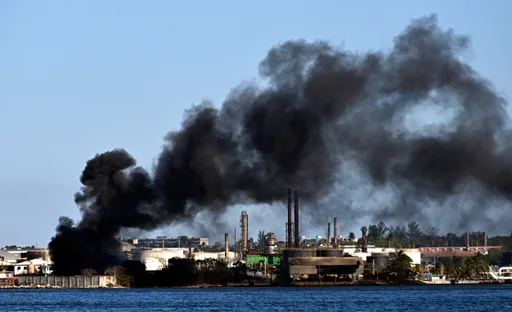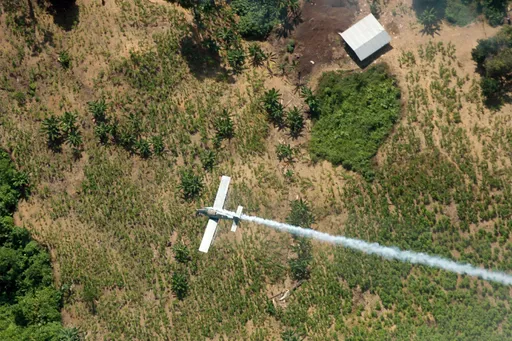Saudi Arabia has temporarily halted production at two Aramco oil facilities that were attacked by Yemeni rebels, interrupting about half of the company's total output, the energy minister said on Saturday.
The attacks "resulted in a temporary suspension of production at Abqaiq and Khurais plants," Prince Abdulaziz bin Salman, the energy minister said in a statement carried by the official Saudi Press Agency.
It led to the interruption of about 50 percent of total production, he added.
"These attacks resulted in production suspension of 5.7 million barrels of crude oil per day," the state-owned Aramco said in a separate statement.
Aramco CEO Amin Nasser said work was underway to restore production and a progress update would be provided in the next two days.
The Houthi rebel drone attacks on Abqaiq and Khurais, two key Aramco facilities in eastern Saudi Arabia, are the latest in a series of raids on the kingdom's oil installations in recent months.
Nasser said "no injuries" were reported in the attacks.
The Iran-linked Houthi rebels said they launched "a large-scale operation involving 10 drones" on the facilities, the group's Al Masirah television reported.
Trump offers support to Kingdom
US President Donald Trump spoke on Saturday with Saudi Crown Prince Mohammad Bin Salman "to offer his support" for the attack.
The White House says in a statement that "The United States strongly condemns today's attack on critical energy infrastructure." The attacks sparked huge fires at a vulnerable chokepoint for global energy supplies.
Spokesman Judd Deere says the attacks by the Iranian-backed Houthis "only deepen conflict and mistrust."
He adds that the US government is "committed to ensuring global oil markets are stable and well supplied."
US Secretary of State Mike Pompeo blamed Iran for the strikes.
"Iran has now launched an unprecedented attack on the world's energy supply," Pompeo said.
Saudi Arabia, a key ally of Washington, has repeatedly accused Iran of supplying arms to the rebels. Tehran denies the charge.
"World's largest crude oil stabilisation plant"
Saudi Aramco describes its Abqaiq oil processing facility in Buqyaq as "the largest crude oil stabilisation plant in the world."
The facility processes sour crude oil into sweet crude, then later transports onto transhipment points on the Persian Gulf and the Red Sea. Estimates suggest it can process up to 7 million barrels of crude oil a day.
The plant has been targeted in the past by militants. Al Qaida claimed suicide bombers tried but failed to attack the oil complex in February 2006.
The Khurais oil field is believed to produce over 1 million barrels of crude oil a day. It has estimated reserves of over 20 billion barrels of oil, according to Aramco.
War in Yemen
A Saudi-led coalition has been battling the Houthi rebels since March 2015. The Iranian-backed Houthis hold Yemen's capital, Sanaa, and other territories in the Arab world's poorest country.
The war has become the world's worst humanitarian crisis. The violence has pushed Yemen to the brink of famine and killed more than 90,000 people since 2015, according to the US-based Armed Conflict Location & Event Data Project, or ACLED, which tracks the conflict.
Since the start of the Saudi-led war, Houthi rebels have been using drones in combat. The first appeared to be off-the-shelf, hobby-kit-style drones. Later, versions nearly identical to Iranian models turned up. Iran denies supplying the Houthis with weapons, although the UN, the West and Gulf Arab nations say Tehran does.
The rebels have flown drones into the radar arrays of Saudi Arabia's Patriot missile batteries, according to Conflict Armament Research, disabling them and allowing the Houthis to fire ballistic missiles into the kingdom unchallenged.
The Houthis launched drone attacks targeting Saudi Arabia's crucial East-West Pipeline in May as tensions heightened between Iran and the US.
In August, Houthi drones struck Saudi Arabia's Shaybah oil field, which produces some 1 million barrels of crude oil a day near its border with the United Arab Emirates.
UN investigators said the Houthis' new UAV-X drone, found in recent months during the Saudi-led coalition's war in Yemen, likely has a range of up to 1,500 kilometres.
That puts the far reaches of both Saudi Arabia and the UAE in range.
The Houthi's Al-Masirah satellite news channel did not immediately acknowledge the attack Saturday, though it said the spokesman of the Houthi's armed forces would soon give a speech on "a major operation," without elaborating.






















